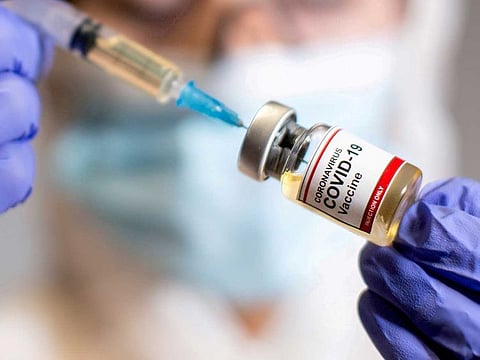5 key things about Europe's vaccine decision
German health minister says vaccines should be effective against new strains

THE HAGUE: The European Medicines Agency (EMA) will decide on Monday (December 21, 2020) whether to give the green light for the Pfizer-BioNTech coronavirus vaccine within the EU. The Amsterdam-based regulator brought the decision forward by eight days under pressure from EU states, after Britain and the US approved the jab more quickly. Here are the key things to know about the decision:
What is the EMA?
The EMA is the regulator for all human and animal medicines in the 27 nations of the European Union. It tests drugs and vaccines for safety and efficacy. Britain is also bound by its rules until the end of the post-Brexit transition period on January 1. The EMA moved from London to Amsterdam in 2019 after Britain left the EU.
What is it deciding on Monday?
The EMA's Committee for Medicinal Products for Human Use will decide whether to recommend approval for a year-long Conditional Marketing Authorisation (CMA) for Pfizer-BioNTech's coronavirus vaccine within the EU. The regulator is allowed to grant a CMA for a medicine during public health emergencies when it can show that the benefits of using it outweigh the risks of speeding up a process that normally takes years.
The EMA has been carrying out a so-called "rolling review" of data from lab tests and clinical trials for the vaccine as they come in. Normally it would only review the data after it has all been collected. A decision on the vaccine by US firm Moderna will be made at a meeting on January 6.
Too slow?
Britain, the United States, Canada, Switzerland, Singapore and Bahrain have all given the green light for the Pfizer-BioNTech jab, meaning that vaccination could get underway. The EMA was originally going to decide on the vaccine on December 29 but it brought the date ahead by eight days after Germany and other European states complained about the delay. If the EMA committee fails to reach a decision on Monday it will hold another meeting on December 29.
What does the EMA say?
The EMA says Britain and the US have only given temporary emergency use authorisation for the vaccine, which requires fewer tests and has to be renewed more frequently. By contrast, it says the Conditional Marketing Authorisation requires a more rigorous testing procedure, and that it lasts a year, with follow-up tests afterwards.It is also "paramount" to ensure public trust in the vaccine at a time when scepticism and disinformation are rife, an EMA source told AFP.
Did Brexit make UK quicker?
British ministers said it did. But it later emerged that Britain was still under the EU's rules during the Brexit transition, however it was allowed to opt-out in emergencies. All EU states were allowed to do so, but made a political decision to go for CMA together to show unity, and to start vaccinations at the same time.
Arguably Brexit had an effect because the EMA took time to work back up to full capacity after its move from London, according to a mid-year report in October. But there were other factors too, with new EMA chief Emer Cooke only starting the job in November. The agency also had to deal with a major cyberattack in which documents relating to the Pfizer-BioNTech and Moderna vaccines were stolen, although it insisted the hack didn't affect the vaccine timeline.
Vaccines effective against new virus strain: German health minister
European Union experts believe existing vaccines against coronavirus are effective against the new fast-spreading strain identified in Britain, Germany's health minister said Sunday. "According to everything we know so far" the new strain "has no impact on the vaccines", which remain "just as effective", Jens Spahn told public broadcaster ZDF, citing "talks between experts at European authorities".
CDC panel endorses Moderna shot
An independent panel of experts advising the Centers for Disease Control and Prevention voted on Saturday to endorse a second coronavirus vaccine for use in adults 18 and older. The committee's recommendation, by a vote of 11-0 (with three recusals due to conflicts of interest), followed Friday's announcement that the vaccine, made by Moderna, had been granted an emergency authorization by the Food and Drug Administration.
The advisory committee's endorsement now awaits final approval from Dr. Robert Redfield, director of the CDC, which is expected shortly. The committee's vote signals to hospitals and doctors that they may proceed to inoculate patients with the Moderna vaccine. Some 5.9 million doses were scheduled to ship on Sunday, and the first vaccinations are expected to begin on Monday.
Unlike the Pfizer-BioNTech vaccine, which was authorized for use in people 16 and older, Moderna's inoculations are intended for adults only. (Moderna did not begin its pediatric studies until Dec. 9 and did not expect to have a full set of data until sometime next year.) In adults, Moderna's vaccine was more than 94% effective at preventing symptomatic cases of COVID-19. It's still unclear how well the two vaccines fare at curbing coronavirus transmission.
Allergic reactions
Much of the advisory committee's deliberations centered on the severe allergic reactions reported after injections of the Pfizer-BioNTech vaccine, which contains ingredients similar to those in Moderna's recipe. Six cases of anaphylaxis have now been documented in the United States, as well as two in Britain. In addition, milder allergic reactions have been reported. Experts have said these cases shouldn't deter a vast majority of people from getting the vaccine. More than 272,000 doses of Pfizer's vaccine have already been doled out nationwide.
Half of the people who received Moderna's vaccine in clinical trials also reported some uncomfortable symptoms, including fatigue, headaches and soreness, after their second shot, given about four weeks after the first. Some volunteers also developed fevers or rashes around injection sites.







